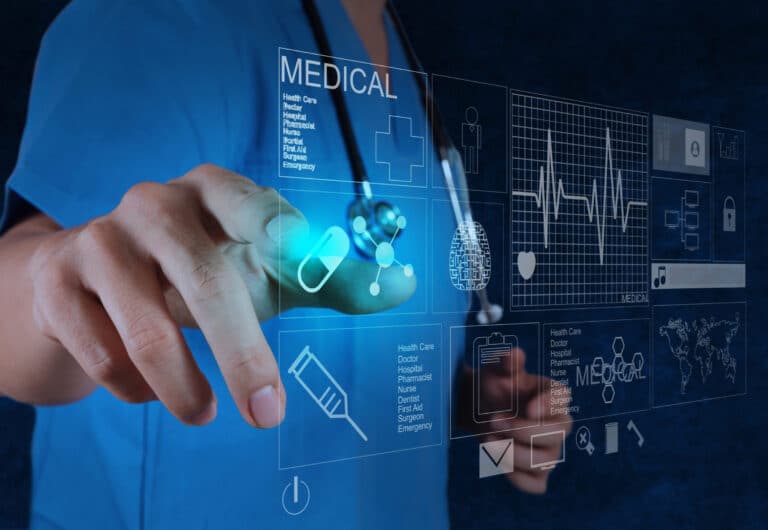Cybersecurity in healthcare continues to be a growing concern for institutions, medical centers, and patients. The annual total of security breaches for enterprise businesses has increased by more than 27%. Cybercrime is expected to cost as much as $10 trillion globally by 2025. Cyber attacks on healthcare institutions are likely to affect patients and their families, some of the most vulnerable people.
The importance of cybersecurity in healthcare increases every day. Healthcare cybersecurity protects some of the most sensitive personal information, such as patient records, medical histories, and financial documents. Let us take a deeper look at healthcare data security and what it means for you in the present and future.
Importance of Data Security in Healthcare
The need for cybersecurity in hospitals can’t be overstated. Medical records contain protected health information (PHI) and other sensitive material related to patient healthcare. Cybersecurity threats expose patients to disruptions in healthcare insurance coverage, identity theft, and financial crimes.
But the threat isn’t isolated to patients and customers. Cybersecurity in healthcare protects insurance providers from service disruptions and allows them to maintain the integrity of their records and documentation.
What a Hospital Cybersecurity Attack Could Look Like
A healthcare cybersecurity threat can take on many forms. While unauthorized access to data centers is the most well-known attack on cybersecurity in the healthcare industry, other attacks can be far more damaging and pose a higher healthcare cybersecurity threat. Cyber attacks on healthcare include:
- Data Breaches
- Distributed Denial of Service (DDoS) Attacks
- Key Logging
- Data Scraping
- Theft of Research Data
- Medical Record Corruption
- Phishing Scams
The variety of risks underscores the importance of cybersecurity in healthcare.

How to Increase Cybersecurity in the Healthcare Industry
The good news for the medical industry: Cybersecurity and healthcare organizations have developed integrated technology platforms to create more secure, efficient working environments for customers and patients. Developing strategic plans to mitigate security breaches in healthcare cybersecurity is where technology services providers step in. Here are some key advantages of using a healthcare technology management organization.
Perform Technology Assessments
A complete examination of your telecommunications and network infrastructure, including your local area networks, voice and wireless environments, can reveal vulnerabilities and allow you to plan for future expansion and implementation.
Evaluate Current and Future Demands
Cybersecurity in hospitals and other health institutions ensures data access at the point of care. It prevents disruptions in IT services, image analysis, recordkeeping, and other cloud-based computing by understanding your bandwidth and encryption requirements now and in the future.
Use Integrated IT Network Services
Managing your healthcare cybersecurity, supply chain, financial documentation, patient records, employee data, and cloud-based services requires a multi-faceted network of interconnecting systems. Utilizing integrated IT network services and interface management tools helps you maintain compliance and streamline training, all within a secure environment. Knowing how to manage integrated IT network services and leaning on a reputable partner to assist your efforts are essential.
Single-Source Infrastructure Management
Know exactly who to call when issues arise with single-source data management and healthcare cybersecurity services. Reduce concerns caused by scaling, implementation, and conversion with cost-effective, all-in-one IT solutions and infrastructure management. Periodic evaluations with your partner are crucial as cyber threats are constantly changing.
Train Employees to Recognize and Prevent Threats
When it comes to healthcare cybersecurity threats, knowledge is the number one prevention tool that your employees can have. Pointcore develops comprehensive education and implementation materials that help your employees recognize potential threats and the steps they need to take to prevent infiltration and loss.
Transforming Healthcare
Learn how Pointcore’s healthcare focus impacts organizations’ areas of need and helps them overcome challenges.
Contact Pointcore for Healthcare Data Security and More
When it comes to healthcare cybersecurity, Pointcore understands your organization’s needs. The healthcare cybersecurity threat is real and comes in many forms. That’s why you need reliable IT networking solutions that protect you from security breaches without disrupting patient services or business operations.
Knowing what your opportunity areas are in cybersecurity and your overall digital footprint is the first step. Pointcore can conduct an assessment and reveal your strategic technology roadmap so you can see the big picture and develop a plan. From infrastructure to support services, Pointcore provides healthcare cybersecurity tools and personnel to manage your data and your network. Contact us today to learn more about the importance of cybersecurity in healthcare or to speak with a representative about our technology services.
Frequently Asked Questions About the Importance of Cybersecurity in Healthcare
Pointcore has a wealth of information to share about the importance of cybersecurity in healthcare. Here are some common questions we receive.
Why is cybersecurity essential for the healthcare industry?
Cybersecurity is crucial because the healthcare industry handles sensitive patient data, including personal information, medical histories, and billing details. Protecting this data ensures regulatory compliance, patient trust, and the smooth operation of healthcare services.
How does digitization impact healthcare cybersecurity?
While digitization, like electronic health records (EHR), offers operational efficiency and improved patient care, it also creates new cyber vulnerabilities. Ensuring your digital tools are secure is paramount.
Are there specific regulations for healthcare cybersecurity?
Yes, standards like the Health Insurance Portability and Accountability Act (HIPAA) in the U.S. set strict regulations for protecting patient data. Non-compliance can result in legal consequences and hefty fines.






